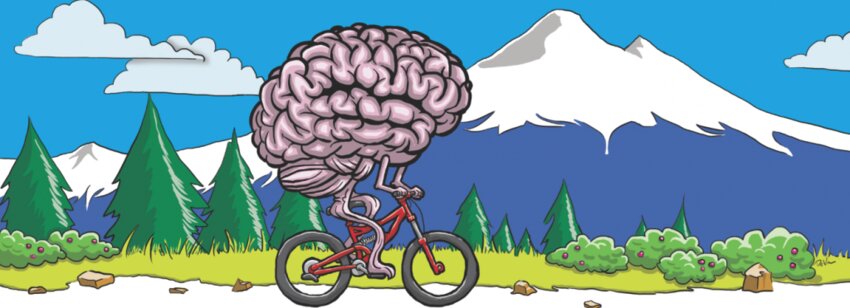 Illustration by Doug De Visser
Illustration by Doug De VisserYou’re riding a technical mountain bike trail with your friend when she takes a hard fall. She was wearing a helmet, and she says she’s OK, but you saw her head hit the ground pretty hard. You’re worried she might have a concussion. What do you do?
In recent years, concussion awareness has been on the rise as the long-term and often debilitating effects of head injuries have come to light. Headlines have focused on the NFL and youth sports, but outdoor enthusiasts are just as likely to suffer accidents resulting in head injuries. Symptoms of the complex condition known as post concussion syndrome can last weeks to years, and research shows that immediate diagnosis and treatment is key to minimizing problems.
A concussion doesn’t necessarily come with a loss of consciousness, and even whiplash can cause one. The degree of head injury and associated symptoms vary, so careful observation of behavior following a fall or blow to the head is essential to detecting a minor brain injury. Symptoms may appear minor at first but should always be taken seriously. Here are some signs to watch for:
• Loss of memory
• Confusion or disorientation
• Unsteadiness, clumsiness
• Mood changes, anxiety, emotional
instability
• Vacant or blank look
• Headache, sleepiness etc.
• Nausea
• Neck pain
• Light insensitivity
In addition to watching for these signs, you can also test orientation, memory and concentration with a few simple questions. To test orientation, ask: Where are we? What day of the week is it? What time is it? For memory, give the person five unrelated words and ask them to repeat them back to you. For concentration, give the person a string of three to five single-digit numbers and ask them to repeat them back to you in reverse order. You can also have them tell you the months of the year in reverse order.
If the person appears to be impaired in any of these areas, it is possible they have a concussion. Continue to monitor symptoms for 24 hours. Do not let the person continue their activity – even minor brain injuries can be exacerbated by exertion. If you are in the backcountry, take frequent breaks and drink and eat snacks. Make sure the person stays alert, even if they feel drowsy. Seek medical attention for a check up. Then, let the person’s brain and body rest for several days with limited activity and limited screen time.
It is always good to get checked out by a medical professional to get the green light to resume activity, and in severe cases an emergency room visit may be in order.
Here’s what not do if you suspect you have a concussion:
Do not take any anti-inflammatory medications (Ibruprofen, Asprin, Advil etc). These medications are blood thinners and could worsen a person’s condition if they suffered a minor brain bleed.
Do not participate in screen time for several days.
Do not allow yourself to go into a deep sleep immediately following the injury.
Smartphone applications are available to help you identify and address concussions. Free iPhone apps such as Concussion Recognition and Response and Concussion Quick Check can help you determine whether or not someone is suffering signs of a concussion and what steps to take. If you don’t have an iPhone or don’t carry it with you in the backcountry, you can also keep a quick screening card in your medical kit.
Post concussion syndrome is a complex condition related to multiple insults to the brain and symptoms can last from months to years. Symptoms include headaches, dizziness, fatigue, anxiety, depression, irritability, insomnia, light sensitivity and difficulty concentrating. Unfortunately, many people suffering from post-concussion syndrome are often misdiagnosed and never receive physical treatment for their condition.
Traditionally, people suffering from post-concussion syndrome have been treated with mood regulating medications and neurocognitive rehabilitation. In more recent years, research has shown that physical therapy for vestibular rehabilitation, visual training and treatment of impairments in the neck can greatly improve post concussive symptoms. Many physical therapists are taking courses related to post-concussion syndrome and have developed programs specifically for concussion screening and treatment. If you believe you are suffering from post concussion syndrome, consider seeing a physical therapist who has experience with vestibular rehabilitation and manual therapy. x